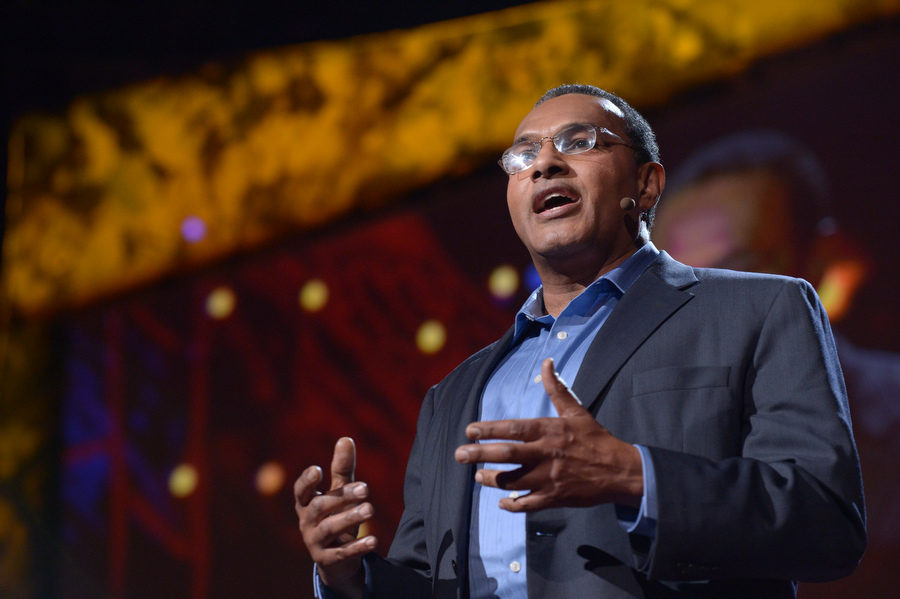Freeman Hrabowski is president of the University of Maryland, Baltimore County (UMBC), which has made an extraordinary name for itself educating students of all types in science and engineering. “What makes our story especially important,” says Hrabowski, “is that we have learned so much from students who are typically not at the top of the academic ladder.” And they have graduated a tremendous number who go on to PhDs and faculty positions at top universities.
Hrabowski himself participated in Martin Luther King Jr.’s “Children’s Crusade.” He marched and was arrested in support of his right to a good education. As he waited in the prison, at 12 years old, Dr. King came over and said to them, “What you children do this day will impact children not yet born.” The lesson Hrabowski learned? “Children can be empowered to take ownership of their education.”
UMBC was founded that very year. What made it especially important to Hrabowski is: “It was the first university founded at a time when students of all races could go there.” For him it was an experiment. Is it possible to have institutions where people of all backgrounds can come and learn to work together? They found they could do a lot in the arts, humanities, and social sciences. The problem was the same problem America continues to face: in science & engineering. African American students were not succeeding. Furthermore, “It’s not just minorities that don’t do well in science and engineering.” Twenty percent of African American students who start a science degree will complete it. But the number for white students is 32%, and 42% for Asian Americans. This is a problem for all of America. He thought, “So many students are smart and can do it. We need to find ways of making it happen.”
So here are the things they did:
- Set high expectations. It takes both a drive, and an understanding that it’s going to be hard work. They had one student who made a C in a core course. They made him re-take it, and he went on to be the first black student to earn a Ph.D. from the University of Pennsylvania. He now works at Harvard.
- Building community among the students. We tend to think cutthroat when it comes to excellence. But, as Hrabowski notes, “It’s one thing to earn an A yourself, it’s another thing to help someone else do well.”
- It takes researchers to produce researchers. He says they need scientists to pull the students into the work, and the students at UMBC are actively involved in the research in the labs.
- Faculty need to be willing to get involved with the students, even in the classroom. Observing every student to see what was wrong with them. One professor wrote, “I have this young black guy in class; he’s not excited about it, he’s not taking notes.” Hrabowski notes that the important part is that the faculty member was observing every student, and, “That young man is now a faculty member, at Duke.”
So many students, says Hrabowski, are bored in class. That’s why UMBC puts emphasis on collaboration, on using technology. Not just teaching theories, but letting students struggle with those theories. And it’s needed. For example, there has been a 79% decline in women majoring in computer science since 2000. He believes that what will work to combat that is building community, and faculty pulling students into the work.
Most important, says Hrabowski, “If a student has a sense of self, it’s amazing how their dreams and values can make all the difference in the world.”
Freeman Hrabowski’s talk is now available for viewing. Watch it here»

Comments (16)
Pingback: Annual Address to Grad Students: UMBC’s President, Dr. Freeman Hrabowski will discuss “Pathways to Leadership,” Weds. March 11, 2015 @UMBC (w/ lunch, Free!) | PROMISE: Maryland's AGEP
Pingback: "I Have Been To The Mountaintop"
Pingback: #EdTech with Eric | Innovation in Higher Education: Leadership and the Role of Technology #CampusTech
Pingback: The best of the web | My Favorite 31 Talks From TED 2013
Pingback: Conditionally Accepted | UMBC President Hrabowski’s Amazing TED Talks
Pingback: Tell Them About the Dream, Martin | prosperosworld.com
Pingback: Tell Them About the Dream, Martin | prosperosworld.com
Pingback: UMBC President, Dr. Freeman Hrabowski’s Amazing TED Talks | my sociology
Pingback: My Social Media Support Group (Because, Let’s Face It, I Need One) | CASE Blog
Pingback: The Limiting Factors of the Public School System | Joscor Technical Research
Pingback: Educators Share Tech Struggles: From Tablets To Twitter – Education – | Tony Gurney
Pingback: Freeman Hrabowski | Edu-Blog
Pingback: TED 2013: 9 Take-Home Themes for Me
Pingback: Hrabowski at TED: Set High Expectations for Students | Giving to UMBC
Pingback: My 13 favourite talks from TED 2013 | Sue Gardner's Blog
Pingback: The Spark: Speakers in Session 3 at TED2013 | Krantenkoppen Tech